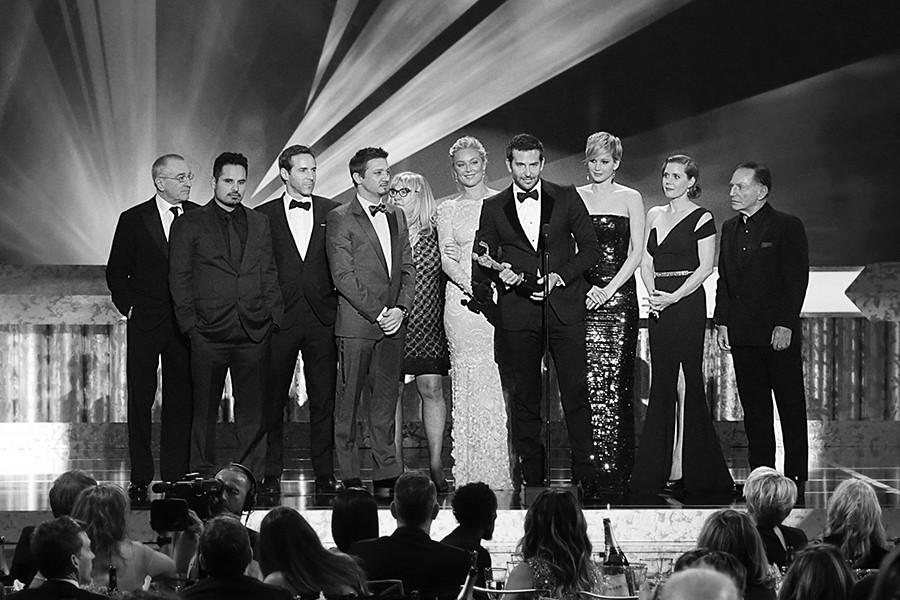The War on Gender Wage Equality: A perspective on the disparities between men’s and women’s paychecks
The “American Hustle” cast on stage at the 20th Annual Screen Actors Guild Awards at the Shrine Auditorium in Los Angeles on Saturday, January 18, 2014. (Robert Gauthier/Los Angeles Times/MCT)
February 4, 2016
Last October, actress Jennifer Lawrence published an essay on the Lenny Letter about the wage gap between working men and women in America entitled “Why Do I Make Less Than My Male Co-Stars?” The essay immediately made headlines, bringing national attention to a problem that is so deeply rooted in American history. Lawrence’s essay was flawless. She pointed out the obvious issue: men get paid more than women even if they have the same credentials, put in the same amount of work, and hold the same title or role simply because they are men.
The most common and fastest response to this debate is, why should actresses and actors like Lawrence care? She’s the face of one multi-billion dollar movie franchise and a lead character of another multi-billion dollar movie franchise, a spokeswoman for Dior, has starred in a dozen popular films in the last several years, and on top of all of this, gets paid for just showing up to events like movie premieres or talk shows. In her essay, Lawrence admits it straight up: she doesn’t need another couple million dollars. Her monetary situation is not relatable to the majority of American women. But actresses like Lawrence also have something else most women don’t have at such a close reach: a platform.
Despite the differences in Lawrence’s paycheck and an ordinary American woman, we need people like her to speak up and take advantage of their platforms when they have the chance. I’ve always thought talking about money is kind of crass, but I applaud Lawrence and other actresses such as Sienna Miller, who recently dropped out of a play for being offered half the paycheck than her male counterpart was offered, for speaking out because it’s time for a change. It’s time to stop these discrepancies. So we can’t fault Lawrence for making ten million dollars a movie and then some. She’s just doing her job, and she’s clearly talented enough to earn that money. The only people we can really fault are ourselves because women haven’t fought hard enough, haven’t shown men that they are equal to their male colleagues and deserve equal treatment. At least until now.
Lawrence didn’t want to further negotiate her deal because if she did, she could come off as “difficult” or “spoiled” to the men that were determining her payroll. It wasn’t until the Sony Hack in 2014 that numerous emails between actors, actresses, producers, and the like were leaked, and the gender disparity between wages came to light. Revealed in the hack were the salaries and payrolls of some of the most well-known celebrities in Hollywood, specifically the “American Hustle” cast, in which Lawrence played one of the main female roles alongside Amy Adams, who also had a considerably lower paycheck than the males in the movie such as Bradley Cooper, Christian Bale, and Jeremy Renner. These men were getting higher paychecks than women, and in one instance, one of the actresses, supposedly Adams, was called a “spoiled brat” when she tried to negotiate for a bigger amount of money. That’s what this debate boils down to: maybe it’s not a matter of the number written on the paycheck, but why that number is written on the paycheck.
Lawrence presents the question that this whole debate can be centered upon: are women socially conditioned to behave this way? Are women supposed to believe that they aren’t worthy of the money that their male counterparts make, solely because they are women? Should they just back down and stop trying so they don’t come off as spoiled, bitchy, bratty, or all of the other negatives that women are seen as when they are trying to get what they want, or better yet, what they deserve?
The backlash from Lawrence’s essay proves her point. One article from Red State entitled, “Thanks, Hollywood, But I Don’t Care What You Have to Say About Pay Inequality,” called Lawrence’s essay “a bratty display.” The article’s main argument, which interestingly enough was written by a woman, was that Hollywood is so much different than normal middle Americans, that actresses and actors have no right to be complaining over the millions of dollars they’re making. The article also argues that Lawrence’s essay was not written factually, bringing up the Equal Pay Act of 1963, which makes it illegal to pay a man more than a woman. Despite the law, studies done by the American Association of University Women and Payscale and the White House, women, in equal roles than men, make 78 to 79 cents to the man’s dollar. Women and men who are not married without kids make the most similar paycheck while married men and women with kids have the biggest disparity.
I’m not sure what a married working woman with children is asking for when she negotiates her paycheck, if she can even negotiate at all. This question also brings up “maternity leave.” In the majority of instances, for example here at Fort Worth Country Day, when a new mother takes off work to care for a newborn they are not given a formal paid leave because they need to take care of their child. Instead, they use their allotted number of given “personal” days to cover the time that they need off. There are multiple acts that can help with this as well. So to say that the reason that mothers are paid less than fathers is because they take the off work for three to four months is void. Men and women, hopefully, are given the same amount of days and do not get paid more or less in their absence. In fact, only 12 percent of all American workers have access to full paid paternal leave. In addition, “paternity leaves” for men are now rising in popularity, as is the case with TOMS CEO and founder, Blake Mycoskie, who just took 12 weeks off to help his wife take care of his newborn. So as complicated as “maternity and paternity leaves” are, it’s not exactly fair to say that women should get paid less because they take time off to care for their child.
The answer to the big question, should women not fight back because they’ve been socially conditioned to think this way, is no; women should not just give up and accept whatever dollar amount they’ve been presented when they should be getting what a man does for the same work. This doesn’t just apply to actresses. In fact, it’s more so for the everyday woman: the lawyers, doctors, assistants, teachers, businesswomen. Lawrence’s male co-stars, Bradley Cooper, Christian Bale, Jeremy Renner, who she noted in her essay, all fought for their deals and succeeded. Like Lawrence said, I agree that no producer left a negotiation with Bradley Cooper and thought, “Man, isn’t he a brat.” If you get called a brat, but you get the paycheck you deserve and have earned, at least your voice was heard, even if the derogatory term was unnecessary and offensive.
It’s frustrating that women have only had the right to vote for 95 years. It’s frustrating that there are still jokes about women being confined to the home that some people don’t think are jokes. It’s frustrating that I might not get a job that I qualify for because I’m a female. It’s frustrating that in other countries, women can’t even get an education without risking their lives. It’s frustrating that I’m discriminated against for something as rudimentary as gender.
However, I think a change is happening. Americans, and hopefully countries all around the world, are starting to take notice that women and their identity is changing, thanks to women like Carly Fiorina, Hillary Clinton and Emma Watson, all who are speaking out and challenging gender roles. Fiorina and Clinton are both highly popular presidential candidates, and most believe that Clinton will secure the Democratic nominee while Fiorina is popular to be the Republican candidate’s vice president. Watson, a self-proclaimed feminist, recently gave a speech to the UN about feminism that rocked the entire world and made this topic something that everyone is now talking about. 2016 is going to be the year that ideas and plans are set into motion, and equality for women in the workplace and beyond will begin.
















